www.chechurubiera.info - an online magazine for fans of Chechu Rubiera
CHECHU ON ...
Signing for USPS
I signed to support Lance in the Tour, then lead the Vuelta. Then Roberto Heras was signed and things changed.
Spanish cycling
We have the best cyclists in the world here.
Spanish teams
When I signed with USPS, Spanish teams did not pay so well as the other teams, German, French or US. I was one of the first Spanish riders to move away from the Spanish teams.
Technology
I didn't have a laptop ... all the Americans had them. Things have changed ... you still can't get a connection in most hotels.
Alberto Contador
He's special. And because he's young, he will improve.
Christine Kahane
She's travels all round France to see the races. She always comes to see us. I will never forget her.
ENCOUNTER 2007
WITH CHECHU RUBIERA IN ASTURIAS
Nicky travels with her family on a 14 hour journey from Scotland to see the landscapes and enjoy the rural culture of northern Spain. And, of course, to meet Chechu in his beloved Asturias.
Asturias holds the key to Chechu's heart, I’m certain of this. In our interviews, and email conversations, he talks warmly about his home land.
I wanted to meet Chechu at home. And lucky for me, he was there.
Now I’ve seen him in the place he grew up. I met his mum at their family home, deep in the Asturian countryside. From the front door, in every direction, there’s a breathtaking view. It’s quiet, there’s no traffic, nobody’s in a hurry. All around there’s fresh air and autumn colour.
Asturias defines Chechu Rubiera. It's his "a paradise of nature". He is rooted here, heart and soul.
Cycling is his job.
First encounters
We met with Chechu twice.
Tom and I, and our three girls, sat outside the only café / bar we’d seen since our arrival in Asturias the day before. Espinaredo, in east Asturias, is a one street pueblo, there are maybe forty houses. And forty horreos, the curious grain stores on stilts and unique to this part of north Spain. It is picture postcard gorgeous.
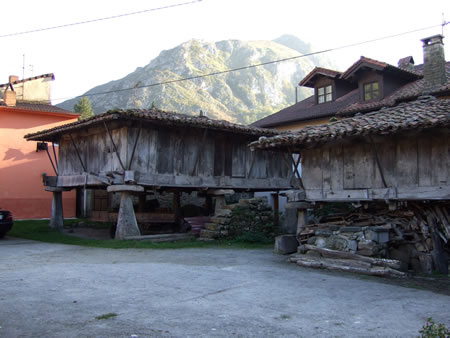
Horreos in Espinaredo
Earlier, we’d seen a ride out of 25 horses, with children and adults enjoying the surprising October heat. They climbed up to a high ridge on the nearby mountain, then back again for a noisy lunch.
Was he late? Actually, no. Five minutes at the most. I was expecting a longer wait, he has a reputation. And it was a 40km drive for him.
And so here was our hero. Chechu Rubiera. Professional cyclist. 17 Grand Tour finishes. Two Giro stage wins. And of course, five historic Tours de France with Lance Armstrong. He was there for The Look, he was there on Luz Ardiden. Daunted. Me? Well, just a little.
With Chechu, however, we already have friendship of sorts, and so it was easy to be with him. And I managed not to fall off my chair, or dribble my mineral water in the first five minutes, which is good for me.
On the website, we have nearly five hundred photos of Chechu Rubiera, mostly good, a few not so good, some just fantastic.
A metre away from me, the real Chechu was just fantastic. He has a happy, open face and great, smiling eyes. He looked really well that day, and rested. He and Laura had been suffering from colds, she was at home recovering. I was sorry about this, I’d liked to have said hello to her.
We talked for a couple of hours, about the Vuelta and that descent on stage 19, the state of cycling today, his future plans (he does have options, which he hopes to finalise in the next few days). We covered all the things a cyclist might be expected to talk about to his fans.
I didn’t prepare questions for him, for the website. It wasn’t that kind of meeting. And I didn’t take photos. I’m not an experienced fan. For me, it wasn’t what he said but simply how he was.
Relaxed and easy-going, Chechu is a gentle man. Pay him a compliment, which we did (just a few times), and he looks straight at you and says simply, “Thank you”.
Chechu’s English is immaculate, and he talked a lot with my husband, Tom. He told us what to see in Asturias. He gave Tom directions and drew a map to his favourite beach, close to Naves. And they briefly talked about bike components, I wish there had been more time for this. Two guys talking about a shared passion.

Chechu's name is still just visible on the road to the Lagos de Covadonga
Cider pouring
And then there was the cider pouring. Sidra is produced in Asturias, and the people there really do drink lots of it. Apples are everywhere, you can pick them off trees at the side of the road. And the smell of fermented apples is ever present, mainly because of the ritual of cider pouring.
Sidra is an alcoholic drink, still and dry. Poured skilfully from height into a thin-sided sidra glass, it acquires bubbles. The taste is transformed.
We’d already bought a litre of cider before Chechu arrived. It didn’t taste that great, obviously we hadn’t poured it properly. Chechu fixed that. He got to his feet and, with some considerable skill, he poured a glass. Only a few drops reached the ground.
I loved watching this little performance, and he knew it. I think he enjoyed it too. It’s another part of his culture, and so it’s important to him. And so he did it again. It’s perhaps the greatest of all my memories.

Across the bridge in Espinaredo
Meeting Loli
I’d said to Chechu that we’d drop in on his parents’ bar in Baldornón. “I’ll take you,” he said. So we met up in the nearest town, Pola de Siero, and we followed him up the road. He was on his bike. No, it wasn’t a Trek but a sleek black and chrome Harley-type beast.
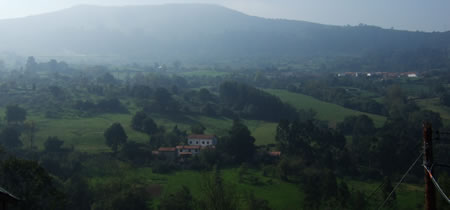
The view across the valley from Chechu's family home in Baldornón
He dropped us a few times on the narrow, twisty roads to Baldornón, but like all great gregarios, he slowed down to help his under-performing team to the finish.
Chechu visits his parents every day, when Laura is at work. His mum makes lunch. (I didn’t like to inspect too closely, I think it was casserole, with frittata and salad.) We were invited to join them, but we’d already eaten. Well, it was after 2 o’clock.
Loli Vigíl is Chechu’s mum. She was lovely to us, indulging our children with snacks from behind the bar and fresh figs from the garden. We came away with a bag of Loli’s apples, they kept us going all week.
In retrospect, I’m not sure that Loli knew who we were or why we were there. Chechu told me that she’d never seen the website. Perhaps she’s used to her son’s fans dropping in. I’m not so sure though.
Chechu grew up in Baldornón, 14km from Gijón, with Loli and José Luis Rubiera Sr, and older sisters, Carolina and Ana.
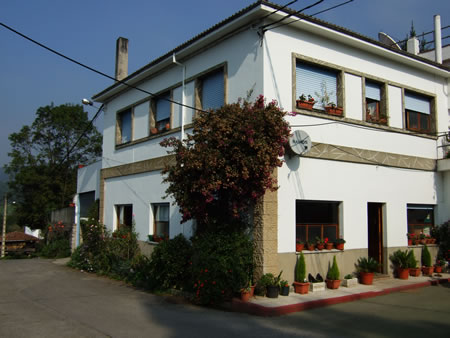
Bar Rubiera, Baldornón
There’s no sign outside Bar Rubiera, so we would never have found it on our own. The bar was empty, apparently it’s busy at weekends when locals come to play cards. They don’t get many tourists, I don’t think they want tourists. Life seems just fine as it is.
On the wall, there’s a huge photograph of Chechu on a climb at the Tour, with Lance on his wheel. I asked Chechu when it was, he couldn’t remember. It was USPS, so maybe 2003. Or 2002. Perhaps 2001.
I asked about Lance, they’ve not really spoken since Solvang in January. Chechu seemed a little wistful at this.
Enigma
For me, Chechu Rubiera is a man with two characters. We’ve all watched him climb, descend, sprint and climb again on his bike, challenging the best in the world. Cycling is a tough sport, and to be competitive at this level, he needs to be aggressive and bloody-minded. How many times have we watched him grind his way through pain, and even ill-health, to get to the finish. His professional life is male-dominated. It's a tough life, a hard man's life.
Yet, I think, the soul of this man is somewhere rather different. He is gentle and easy going, friendly and endlessly hospitable. He makes delicious apple jam and when he’s home, he gardens and visits his mum.
I asked him how this can be. He shrugged. “Some people say this is why I haven’t won more.”
Did he regret this? “No. I am happy as I am.”
So what did Chechu really think of the website? "It's great, you know everything about me."
Clearly, that's not true, I think we know very little. And I'm curious why he's not more questioning of us. After all, we manipulate his image, report his every move and inevitably, add our opinion and comment. I had to press him further and told him that it was really important to Rebecca and me that he's happy with what we've done, and that we have his confidence.
He looked at me and said, "You have it". I didn't say anything more about the website, it was enough.

Just to prove I was there! Can't remember what was being said, but it was very funny.
Now, more than ever, it clear to me that Chechu occupies a different world. In truth, we have very little in common. A very few mutual acquaintances, and I suspect some shared values about politics and humanity.
As a professional cyclist, Chechu's life on the other side of the glass is very different. And unless you've been there, you just can't know.
2008
At the moment, Chechu is pre-occupied with his future. He was told about the decision to end Team Discovery by the driver who collected him from an airport in Germany. I'd read that he knew before the official announcement, somehow I imagined that Lance would have phoned him personally, after all those mountains. But there was no call.
He still seems genuinely surprised, and disheartened, that his beloved sport has sunk so low that the top team in the world can't find a sponsor. There was no anger. That's life, that's cycling.
For me, it's disheartening that a cyclist like Chechu is still looking for team, when others, confessed or still hiding, continue to ride. It just doesn't seem fair.
He told us openly about his negotiations with a Pro-Tour team that he is keen to join (I do know which team, but that's not my news to tell). It sounded like a deal was close. Three weeks later, he must be frustrated that these negotiations are continuing and still he doesn't know.
Johan Bruyneel called him about Astana, not as a cyclist, but as a director sportif. The idea brought a smile, he hadn't thought about management just yet. He wants to race for another year. In his head, he's a cyclist.
And yet, Chechu's a pragmatist. He knows that turning Johan down is a decision he might regret.
So what about engineering? We all know he worked hard, during many years of racing, to get a degree in electrical engineering. There are two openings for him with engineering companies, but he's realistic. He comes into the industry late, he'd have to start at the bottom. I don't sense he's concerned about that, but he's not ready to turn his back on his bike just yet. I can't see him sitting at a desk all day, not at a computer.
The bikes
Another curious unknown for Chechu is whether he will have to give his bikes back to Discovery Channel. He was particularly keen to keep his time-trial Trek Madone, but thought it would probably be packed up and sent to Belgium.
From there, it'll end up in the garage of some faceless marketing executive of a sponsor, or perhaps on eBay (that's my opinion, not Chechu's). It's better kept where it belongs with Chechu.
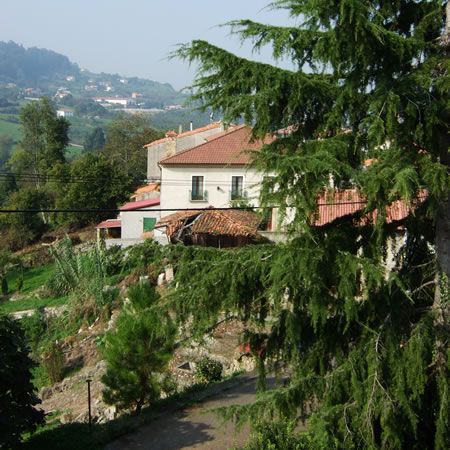
Baldornón and the view towards Gijón
Misconceptions
I have read a lot of cycling publications, and somewhere I recall reading that cyclists are superstitious about injuries. They don't talk about them. When I mentioned this, Chechu looked at me incredulously, like I'd suggested the Fernando Alonso was passed his best. "No, that's not true."
My husband broke his left collarbone during a race for his road club last year. Chechu also did this when he was a teenager and it had to be re-set. This year, he's been lucky with no big falls.
I mentioned Tom Danielson's fall in Stage 1 of the Vuelta. What a blow for him. "He was happy! When he came to say goodbye to us, he was very happy, smiling and shaking our hands. He was glad to be going home. He and Johan didn't get on." It was the same with Triki Beltran apparently.
China
China was a mistake. Chechu's lacklustre performance in the early stages of the Vuelta were due to virus he caught there. The results of recent tests confirmed this. Other team members, including Janez Brajkovich, were also affected.
I asked about cycling at altitudes of 4000m. "You have no power. You're breathing hard, cycling as hard as you can, but you look down at the power meter and there's nothing there."
Banesto
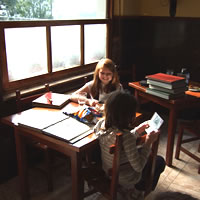 At his parents' bar in Baldornón, as Chechu had lunch, Tom and I browsed cuttings and photographs from Chechu's career, back to the early 1990s. Everything is there, all in Spanish. Features and interviews with a fresh-faced Rubiera, race reports, and team cards from his first professional team Artiach.
At his parents' bar in Baldornón, as Chechu had lunch, Tom and I browsed cuttings and photographs from Chechu's career, back to the early 1990s. Everything is there, all in Spanish. Features and interviews with a fresh-faced Rubiera, race reports, and team cards from his first professional team Artiach.
There was a young Carlos Sastre, developing his grimace. But as I scoured one team photo for familiar faces, Chechu said "I'm the only one there still cycling, none of the rest made it this far."
There are also photographs from 1994, when as an amateur, he rode in Banesto colours. Miguel Indurain's team, Chechu's hero.
All his earlier photographs were lost, in some calamity. So no baby photos, sadly.